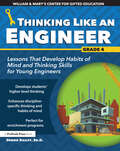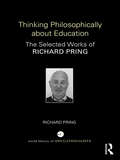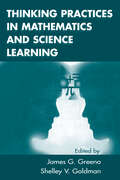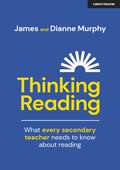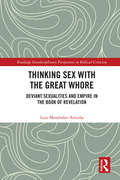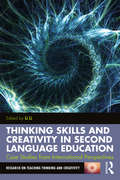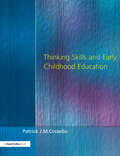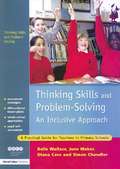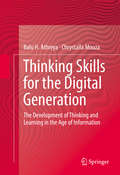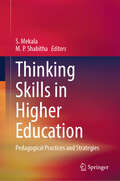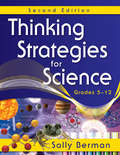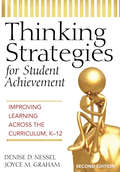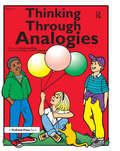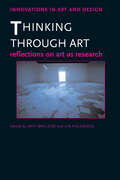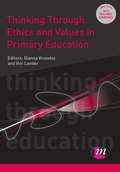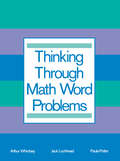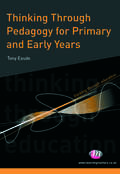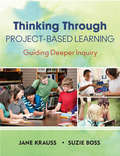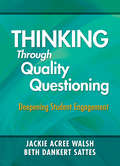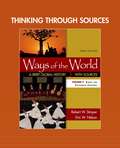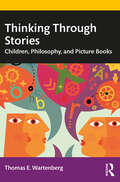- Table View
- List View
Thinking Like an Engineer: Lessons That Develop Habits of Mind and Thinking Skills for Young Engineers in Grade 4
by Debbie DaileyThinking Like an Engineer focuses on high-interest, career-related topics in the elementary curriculum related to engineering. Students will explore interdisciplinary content, foster creativity, and develop higher order thinking skills with activities aligned to relevant content area standards. Students will complete design challenges, visit with an engineer, and investigate real-world problems to plan feasible engineering solutions. Thinking Like an Engineer reflects key emphases of curricula from the Center for Gifted Education at William & Mary, including the development of process skills in various content areas and the enhancement of discipline-specific thinking and habits of mind through hands-on activities. Grade 4
Thinking Philosophically about Education: The Selected Works of Richard Pring
by Richard PringIn the World Library of Educationalists series, international experts themselves compile career-long collections of what they judge to be their finest pieces – extracts from books, key articles, salient research findings, major theoretical and practical contributions – so the world can read them in a single manageable volume. Readers will be able to follow the themes and strands and see how their work contributes to the development of the field. Thinking Philosophically about Education highlights several key writings from Richard Pring’s international career in education, providing a historical perspective in relation to current debates about philosophy of education in the UK and internationally, drawing attention to issues of current concern. The text explores key themes such as critical realism, teachers as researchers and a way forward for policy through carefully selected examples from Richard Pring’s writings. A short introduction is provided for each chapter to help readers to understand the significance of what is presented and how this relates to other chapters in the book. Comprehensible and articulate, this selection displays the knowledge and rigor that has made Richard Pring one of the world’s most respected and eminent scholars of the field of philosophy and education. Comprising Richard Pring’s personal selection of what he considers to be his influential writing from book chapters and journal articles throughout his career, it will be of interest to all followers of his work and any reader interested in the development of philosophy and education in the UK and internationally.
Thinking Practices in Mathematics and Science Learning
by James G. Greeno Shelley V. GoldmanThe term used in the title of this volume--thinking practices--evokes questions that the authors of the chapters within it begin to answer: What are thinking practices? What would schools and other learning settings look like if they were organized for the learning of thinking practices? Are thinking practices general, or do they differ by disciplines? If there are differences, what implications do those differences have for how we organize teaching and learning? How do perspectives on learning, cognition, and culture affect the kinds of learning experiences children and adults have? This volume describes advances that have been made toward answering these questions. These advances involve several agendas, including increasing interdisciplinary communication and collaboration; reconciling research on cognition with research on teaching, learning, and school culture; and strengthening the connections between research and school practice. The term thinking practices is symbolic of a combination of theoretical perspectives that have contributed to the volume editors' understanding of how people learn, how they organize their thinking inside and across disciplines, and how school learning might be better organized. By touring through some of the perspectives on thinking and learning that have evolved into school learning designs, Greeno and Goldman begin to establish a frame for what they are calling thinking practices. This volume is a significant contribution to a topic that they believe will continue to emerge as a coherent body of scientific and educational research and practice.
Thinking Reading: What every secondary teacher needs to know about reading
by Dianne Murphy James MurphyDespite the efforts of teachers and educators, every year secondary schools across the English-speaking world turn out millions of functionally illiterate leavers. The costs in human misery and in wasted productivity are catastrophic. What can schools do to prevent this situation? In this highly accessible book James and Dianne Murphy combine more than 50 years of experience to provide teachers with a thorough, easy to use introduction to the extensive research on reading and its effects on student achievement. Drawing on the work of experts from around the world, the authors explore how we learn to read, how the many myths and misconceptions around reading developed, and why they continue to persist.Building on these foundations chapters go on to examine how the general secondary school classroom can support all levels of reading more effectively, regardless of subject; how school leaders can ensure that their systems, practices and school culture deliver the very best literacy provision for all students; and what it takes to ensure that a racing intervention aimed at adolescent struggling readers is truly effective. The overall message of this books is one of great optimism: the authors demonstrate that the right of every child to learn to read is entirely achievable if schools employ the best research-driven practice.
Thinking Reading: What every secondary teacher needs to know about reading
by Dianne Murphy James MurphyDespite the efforts of teachers and educators, every year secondary schools across the English-speaking world turn out millions of functionally illiterate leavers. The costs in human misery and in wasted productivity are catastrophic. What can schools do to prevent this situation? In this highly accessible book James and Dianne Murphy combine more than 50 years of experience to provide teachers with a thorough, easy to use introduction to the extensive research on reading and its effects on student achievement. Drawing on the work of experts from around the world, the authors explore how we learn to read, how the many myths and misconceptions around reading developed, and why they continue to persist.Building on these foundations chapters go on to examine how the general secondary school classroom can support all levels of reading more effectively, regardless of subject; how school leaders can ensure that their systems, practices and school culture deliver the very best literacy provision for all students; and what it takes to ensure that a racing intervention aimed at adolescent struggling readers is truly effective. The overall message of this books is one of great optimism: the authors demonstrate that the right of every child to learn to read is entirely achievable if schools employ the best research-driven practice.
Thinking Sex with the Great Whore: Deviant Sexualities and Empire in the Book of Revelation (Routledge Interdisciplinary Perspectives on Biblical Criticism)
by Luis Menéndez-AntuñaMany scholars in Biblical and Revelation studies have written at length about the imperial and patriarchal implications of the figure of the Whore of Babylon. However, much of the focus has been on the links to the Roman Empire and ancient attitudes towards gender. This book adds another layer to the conversation around this evocative figure by pursuing an ideological critique of the Great Whore that takes into account contemporary understandings of sexuality, and in so doing advances a de-moralization of apparent sexual deviancy both in the present and in the past. Offering an emancipatory reading of Revelation 17-18 using Foucauldian, postcolonial and queer historiographies, this study sets out alternative paths for identity construction in Biblical texts. By using these alternative critical lenses, the author argues that the common neglect of the ethical and political impact of Biblical texts in the present can be overcome. This, in turn, allows for fresh reflection on the study of the Bible and its implications for progressive politics. Situated at the intersection of Revelation Studies, Biblical Studies and Hermeneutics, as well as Contextual/Liberationist Theologies and Queer and Postcolonial Criticism, this is a cutting edge study that will be of keen interest to scholars of Theology and Religious Studies.
Thinking Skills and Creativity in Second Language Education: Case Studies from International Perspectives (Research on Teaching Thinking and Creativity)
by Li LiAcross the world, education is being restructured to include greater focus on developing critical and creative skills. In second language education, research suggests that cognition and language development are closely related. Yet despite increasing interest in the teaching of thinking skills, critical thinking has not been widely intergrated into language teaching. Thinking Skills and Creativity in Second Language Education presents a range of investigations exploring the relationship between thinking skills and creativity, and second language education. Focusing on cognitive, affective, social, and emotional perspectives, this book highlights current research and raises questions that will set the direction for future research. Its aims are as follows: Provide an in-depth understanding of the link between second language development and thinking skills. Consider approaches to developing thinking skills in second language instruction. Examine practices in implementing thinking skills in second language learning. Offer an updated list of sources of information on thinking skills in second language education. A new addition to the Research on Teaching Thinking and Creativity series, this book is relevant to researchers in the field of educational psychology, to Masters degree and PhD students in this field, and to anyone interested in developing thinking skills.
Thinking Skills and Early Childhood Education
by Patrick J. CostelloThis text offers a rationale for the popular idea among teachers and researchers that young children should be taught critical thinking and argument in the early years of their education.
Thinking Skills and Problem-Solving - An Inclusive Approach: A Practical Guide for Teachers in Primary Schools
by Belle Wallace Diana Cave June MakerDiscover and develop your pupils' strengths across the multiple intelligences by improving their problem solving skills. This book will: tell teachers all they need to know about multiple intelligences and problem solving provide a bank of problems that can be integrated into any lesson plan help teachers to identify gifted and able pupils guide schools on how to organize their curriculum using example curriculum plans. For teachers working across the Foundation Stage, Key Stages One and Two, Headteachers and those working at management level.
Thinking Skills for the Digital Generation
by Balu H. Athreya Chrystalla MouzaThis important text synthesizes the state of knowledge related to thinking and technology and provides strategies for helping young people cultivate thinking skills required to navigate the new digital landscape. The rise of technology has resulted in new ways of searching and communicating information among youth, often creating information "overload". We do not know how the new technologies will affect the ways young people learn and think. There are plenty of warnings about the dangers of information technology, but there is also enormous potential for technology to aid human thinking, which this book explores from an open-minded perspective. Coverage Includes: - An up to date review of the literature on thinking skills in general, and in relation to technology. - Practical guidelines for thinking with technology. - A scholarly review of the characteristics of the digital generation. - A discussion of the various steps involved in the thinking process. - A historical context of the Information Age and the transition from oral history, to printing press, to the Internet. Thinking Skills for the Digital Generation: The Development of Thinking and Learning in the Age of Information is an invaluable reference for educators and research professionals particularly interested in educational technology, and improving thinking and problem-solving skills.
Thinking Skills in Higher Education: Pedagogical Practices and Strategies
by S. Mekala M. P. ShabithaThis edited volume illustrates the need for imparting thinking skills in education and workplace training to excel in the 21st century. It deals with the diversity of thinking skills in all domains. It is a valuable resource to understand human cognition and its interaction with human emotion for better social cognition in this digitalized era. This book assists in selecting appropriate thinking skills to be applied in the multitasking environment. It also offers essential strategies to be employed by the learners and teachers for improving thinking skills in the teaching-learning context and the workplace. The book also provides solutions for coping with the cognitive strain evident while performing complex tasks. It comprises six sections. Each section addresses different thinking skills related to social cognition, meta-emotion, meta-thinking, digital thinking, workplace thinking, lateral thinking, innovative thinking, positive activating thinking, thinking skills in language production, achievement motivation and pragmatic thinking. Thinking skills and strategies examined in the chapters are participative, diverse and interconnected, fostering individuals to think collectively to get innovative solutions in complex situations. This book is a valuable resource for Educators, Researchers, Skill Trainers, Strategic Trainers, Trainers of Thinking skills in the corporate sector, and individuals who aspire to be effective thinkers in society.
Thinking Strategies for Science, Grades 5-12
by Sally BermanWith reproducibles and a new section on designing activities, this revised edition presents strategies and standards-aligned lessons that strengthen student comprehension and higher-level thinking skills in science.
Thinking Strategies for Student Achievement: Improving Learning Across the Curriculum, K-12
by Denise D. Nessel Joyce M. GrahamThis revised edition offers 30 specific strategies, readily integrated into daily lesson plans, to help K-12 students extend their thinking capabilities and raise their achievement levels.
Thinking Through Analogies: Grades 3-6
by Bonnie L. RisbyAn analogy is a comparison between two things. It points out the similarities between two things that might be different in all other respects. Analogies cause us to think analytically about forms, uses, structures, and relationships. This all-time favorite resource not only gives students a chance to practice solving analogies, but also invites them to open their minds to a completely new way of analyzing the elements of analogies. Each page introduces several categories of analogies. Each category expands students' way of viewing the world and contrasting and comparing elements. Thinking Through Analogies also instills the tools whereby students can create relationships to enhance their creative and formal writing, as well as to heighten their critical thinking in test taking. Other books that teach analogies are Analogies for Beginners and Analogies for the 21st Century.Grades 3-6
Thinking Through Art: Reflections on Art as Research (Innovations In Art And Design Ser.)
by Katy Macleod Lin HoldridgeFocusing on a unique arena, Thinking Through Art takes an innovative look at artists’ experiences of undertaking doctorates and asks: If the making of art is not simply the formulation of an object but is also the formation of complex ideas then what effect does academic enquiry have on art practice? Using twenty-eight pictures, never before seen outside the artists’ universities, Thinking Through Art focuses on art produced in higher educational environments and considers how the material product comes about through a process of conceiving and giving form to abstract thought. It further examines how this form, which is research art sits uneasily within academic circles, and yet is uniquely situated outside the gallery system. The journal articles, from eminent scholars, artists, philosophers, art historians and cultural theorists, demonstrate the complexity of interpreting art as research, and provide students and scholars with an invaluable resource for their art and cultural studies courses.
Thinking Through Ethics and Values in Primary Education (Thinking Through Education Series)
by Carol Hughes Gianna Knowles Linda Cooper Barbara Thompson Sally Hawkins Mrs Vini Lander Glenn Davis StoneThinking Through Ethics and Values in Primary Education is an accessible text that encourages readers to explore deeply the ethics and values surrounding primary education. The text helps the reader to critically reflect on the principles that underpin education. Specifically written for education students in the later years of their course, the text draws on research and practice to explore the challenges and opportunities involved, while helping to develop the reader's own critical thinking skills. The book begins by asking 'what are ethics and values?' and goes on to explore social diversity and society and education. It considers ethics and values and the curriculum, school organisation and the classroom. A chapter on ethics, values and the teacher encourages the reader to examine their own thoughts about education. Throughout, practical guidance runs alongside structured critical thinking exercises to help the reader and reflect on both theory and practice. About the Series Thinking Through Education is a new series of texts designed and written specifically for those education students entering the second or final phase of their degree course. Structured around sets of specific 'skills', each chapter uses critical thinking and reflective exercises to develop greater subject knowledge and critical awareness.
Thinking Through Ethics and Values in Primary Education (Thinking Through Education Series)
by Carol Hughes Gianna Knowles Linda Cooper Barbara Thompson Sally Hawkins Mrs Vini Lander Glenn Davis StoneThinking Through Ethics and Values in Primary Education is an accessible text that encourages readers to explore deeply the ethics and values surrounding primary education. The text helps the reader to critically reflect on the principles that underpin education. Specifically written for education students in the later years of their course, the text draws on research and practice to explore the challenges and opportunities involved, while helping to develop the reader's own critical thinking skills. The book begins by asking 'what are ethics and values?' and goes on to explore social diversity and society and education. It considers ethics and values and the curriculum, school organisation and the classroom. A chapter on ethics, values and the teacher encourages the reader to examine their own thoughts about education. Throughout, practical guidance runs alongside structured critical thinking exercises to help the reader and reflect on both theory and practice. About the Series Thinking Through Education is a new series of texts designed and written specifically for those education students entering the second or final phase of their degree course. Structured around sets of specific 'skills', each chapter uses critical thinking and reflective exercises to develop greater subject knowledge and critical awareness.
Thinking Through Math Word Problems: Strategies for Intermediate Elementary School Students
by Arthur Whimbey Jack Lochhead Art Whimbey Paula B. PotterThis innovative text teaches elementary school students the techniques of critical thinking and problem solving and applies those methods to mathematical word problems. It supplements traditional fourth, fifth, and sixth grade textbooks and increases students' thinking and problem solving abilities. Students are taught the fundamentals of these processes by applying them both to simple and multi-step problems which are provided. These problems -- many written by elementary school pupils --gradually increase in difficulty, making learning both fun and stimulating. Special attention is given to typical errors and sources of conceptual difficulty.
Thinking Through New Literacies for Primary and Early Years (Thinking Through Education Series)
by Debbie Simpson Mike Toyn Jayne Metcalfe Ian ToddThinking Through New Literacies for Primary and Early Years is an accessible text that encourages readers to consider deeply what is meant by ′literacy′ today. It explores the many different ways in which teachers and children develop their own literacy. Specifically written for education students in the later years of their course, the text draws on research and practice to explore the challenges and opportunities involved, while helping to develop the reader′s own critical thinking skills. The book begins by asking ′what′s new about new literacies?′ and goes on to explore some technological innovations designed to support the emergent reader and writer. It considers verbal literacy, speaking and listening, and visual literacy. Readers are encourages to think through the issues surrounding inclusion and the legal and ethical issues raised by this post-typographic age. Throughout, practical guidance runs alongside structured critical thinking exercises to help the reader reflect on both theory and practice. About the Thinking Through Education Series Thinking Through Education is a series of texts designed and written specifically for those education students entering the second or final phase of their degree course. Structured around sets of specific ′skills′, each chapter uses critical thinking and reflective exercises to develop greater subject knowledge and critical awareness. Each book contains links to the Teachers′ Standards providing students with a clear transition from study to practice. Jayne Metcalfe is a senior lecturer in the Faculty of Education at the University of Cumbria. Jayne is involved in e-safety training of student teachers. Debbie Simpson is a senior lecturer in the Faculty of Education at the University of Cumbria. She is currently the acting Programme Leader for the Primary PGCE course. Ian Todd is a senior lecturer in the Faculty of Education at the University of Cumbria, with a specialism in English and an interest in the teaching of ICT. Mike Toyn is a senior lecturer in the Faculty of Education at the University of Cumbria where he also coordinates the teaching of primary ICT.
Thinking Through Pedagogy for Primary and Early Years (Thinking Through Education Series)
by Tony EaudeThis practical, accessible book encourages a deep, often challenging, consideration of how young children learn and how teachers and other adults best support their learning. Essential reading for education students, it draws on research and practice to help readers reflect critically on their beliefs and practice. After comparing different views of pedagogy, it explores children′s development and the importance of culture and context, emphasising the attributes of successful learners, relationships and the learning environment. Readers are helped think through how different aspects of pedagogy are interlinked and consider the implications for breadth, balance, planning and assessment and continuing professional development.
Thinking Through Project-Based Learning: Guiding Deeper Inquiry
by Jane Krauss Suzie K. BossEverything you need to know to lead effective and engaging project-based learning! This timely and practical book shows how to implement academically-rich classroom projects that teach the all-important skill of inquiry. Teachers will find: A research-driven case for project-based learning, supported by current findings on brain development and connections with Common Core standards Numerous sample projects for every K-12 grade level Strategies for integrating project-based learning within all main subject areas, across disciplines, and with current technology and social media Ideas for involving the community through student field research, special guests, and showcasing student work
Thinking Through Quality Questioning: Deepening Student Engagement
by Jackie A. Walsh Beth D. SattesAsking the right questions is the answer This groundbreaking book provides teachers with an accessible, research-based blueprint for developing student metacognitive skills and ensuring that students take responsibility for their own learning. The authors use the findings of cognitive scientists to highlight quality questioning behaviors and explain how to apply them for improved student outcomes. Key features include: Short vignettes of quality questioning in action Evidence that ties question strategy to student achievement An overview of collaborative, written, electronic, and group response strategies Examples of how quality questioning connects to formative assessment Special note regarding the eBook version: Some figures have been redacted in compliance with digital rights permissions.
Thinking Through Quality Questioning: Deepening Student Engagement
by Jackie A. Walsh Elizabeth D. SattesAsking the right questions is the answer This groundbreaking book provides teachers with an accessible, research-based blueprint for developing student metacognitive skills and ensuring that students take responsibility for their own learning. The authors use the findings of cognitive scientists to highlight quality questioning behaviors and explain how to apply them for improved student outcomes. Key features include: Short vignettes of quality questioning in action Evidence that ties question strategy to student achievement An overview of collaborative, written, electronic, and group response strategies Examples of how quality questioning connects to formative assessment Special note regarding the eBook version: Some figures have been redacted in compliance with digital rights permissions.
Thinking Through Sources For Ways Of The World: A brief Global History
by Robert W. Strayer Eric W NelsonDesigned specifically to be used with all versions of Ways of the World, Third Edition, this document collection complements and extends each chapter of the parent textbook. As the title of the collection suggests, these document projects enable students to "think through sources" and thus begin to understand the craft of historians as well as their conclusions. They explore in greater depth a central theme from each chapter, and they integrate both documentary and visual sources. Each source includes a brief headnote that provides context for the source and several questions to consider, and the chapter ends with a series of probing essay questions appropriate for in-class discussion and writing assignments. In addition to this print volume, we are delighted to offer the Thinking through Sources document projects in LaunchPad, Bedford's learning platform. In LaunchPad, these features are surrounded by a distinctive and sophisticated pedagogy of auto-graded exercises. Featuring immediate substantive feedback for each rejoinder, these exercises help students learn even when they select the wrong answer. These unique exercises guide students in assessing their understanding of the sources, in organizing those sources for use in an essay, and in drawing useful conclusions from them. In this interactive learning environment, students will enhance their ability to build arguments and to practice historical reasoning.
Thinking Through Stories: Children, Philosophy, and Picture Books
by Thomas E. WartenbergThis book provides justification and instruction for exploring philosophy with children, especially by using picture books to initiate philosophical discussion. By demonstrating to teachers, and others that picture books often embed philosophical issues into their narratives, and that this makes picture books a natural place to go to help young children investigate philosophical issues, the author offers a straightforward approach to engaging young students. In particular, this volume highlights how philosophical dialogue enhances children’s sense of self, provides a safe space for the discussion of issues that they are confronted with in living their lives, and develops an admirable method for resolving conflict that the children can use in other contexts.
